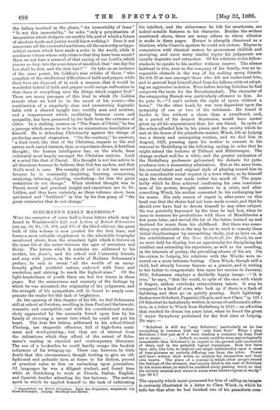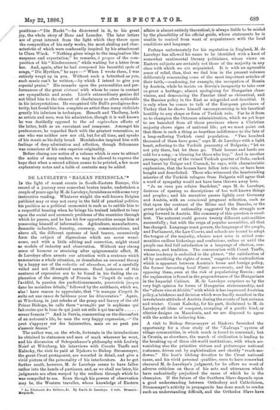SCHUMANN'S EARLY MANHOOD.* Wan the exception of some half-a-dozen letters
which may be found in Wasielewski's Life and Letters of Robert Schumann (see pp. 58, 80, Z)31, 334, and 335 of the third edition), the great bulk of this volume is now printed for the first time, and forms a most valuable supplement to the admirable biography mentioned above, from the abundant light which it throws on the inner life of the writer between the ages of seventeen and thirty. The letters which it contains are addressed to his mother, his franc6e, and his school and University friends, and may with justice, in the words of Madame Schumann's preface, be said to reveal "all the wealth of an excep- tionally gifted youthful nature, endowed with force and resolution, and striving to reach the highest aims." Of the light-heartedness of youth there are but few traces in these pages. But the earnestness and sincerity of the feelings by which he was animated, the originality of his judgments, and the strength of his sympathies, will be found to amply com- pensate the reader for this lack of brightness.
At the opening of this chapter of his life, we find Schumann still at school at Zwickau, revelling in Jean Paul and Sarbiewski, romantic and susceptible, and with his constitutional melan- choly aggravated by the necessity forced upon him by his family of choosing a career into which he could not put his heart. The first few letters, addressed to his school-friend Flecheig, are rhapsodic effusions, full of high-flown senti- ment and word-painting ; but they are of interest from the indications which they afford of the extent of Schn- mann's reading in classical and contemporary literature. The son of a bookseller, he could hardly escape the bookish influences of his bringing-up. There can, however, be little doubt that this circumstance, though tending to give an old- fashioned and pedantic tarn at times to his diction, proved of practical value to him on embarking upon journalism. Of languages he was a diligent student, and found time while at Heidelberg to work at French, Italian, English, and Spanish, besides attending his law lectures. The serious spirit in which he applied himself to the task of cultivating
• .Tegendbriefe tax Robert Schionamt. Bach den Originalen, raitgetheilt von Clara Schumann. Leipzig: Breitkopt end Hertel.
his intellect, and the abhorrence he felt for smatterers, are indeed notable features in his character. Besides the writers mentioned above, there are many others to whom allusion is made in these pages. Horace is abruptly dismissed as a libertine, while Cicero's egotism he could not endure. Rhyme in comparison with classical metres he pronounces childish and annoying, and upon many similar topics his judgments are equally dogmatic and outspoken. Of his relations to his fellow- students he speaks to his mother without reserve. The silence habitual in him, even in the company of his family, was an in- superable obstacle in the way of his making many friends. He felt ill at ease amongst those who did not understand him, and in general kept himself aloof from his fellows without adopt- ing an aggressive isolation. Even before leaving Zwickau he had outgrown the taste for the Burschenschaft. The character of the swaggering Bursch was particularly offensive to him. As he puts it,—" I can't endure the sight of spurs without a horse." On the other hand, he was very dependent upon the sympathy of one or two of his intimates. He found it harder to live without a chum than a sweetheart, and, in a period of his deepest depression, would have sooner given up all his acquaintance than his one friend. In spite of the solace afforded him by his piano, and the society which he met at the house of his pianoforte-master, Wieck, life at Leipzig was a dreary and uninspiring routine, and we find him in August, 1828, pressing upon his mother to consent to his removal to Heidelberg in the following spring, in order that he might attend the lectures of Thibaut and Mittermayer. The change worked well for a while, and the greater animation of the Heidelberg professors galvanised his distaste for jurist- prudence into a momentary admiration. But at the same time, his musical talent and original style of playing caused him to be in considerable social request in a town where, as he himself says, the student was made rather too much of. The popu- larity which he thus achieved confirming his own conscious- ness of his powers, brought matters to a crisis, and after consulting Wieck, his mother consented to his exchanging law for music. His only source of regret in after-years on this head was that the choice had not been made sooner, and that he
should ever have had to devote himself to any other subject. He was painfully depressed by the time he had lost, when he came to measure his productions with those of Mendelssohn a few years later, and envied the lot of the latter, trained up and
destined for music from his childhood. But there was some- thing very admirable in the way he set to work to remedy these initial disadvantages by unremitting study, just as later on, in the establishment of the Neue Zeitschrift far 3fusik, he saw no mere field for display, but an opportunity for disciplining his intellect and extending his experience, as well as for assailing, in the interests of poetry, the prevailing abuses of his art. On his return to Leipzig, his relations with the Wiecks were re- newed on a more intimate footing. Clara Wieck, though still a child, had already become famous as a pianist, and in writing to her father to congratulate him upon her success in January,.
1832, Schumann employs a decidedly happy image :—" It is true," he says, "that the world, in spite of the ease with which it forgets, seldom overlooks extraordinary talent. It may be- compared to a herd of cows, who look up if there is a flash of lightning, and then go on quietly grazing. Such lightning- flashes were Schubert, Paganini, Chopin, and now Clara." (p. 161.) Of Schubert he had already written in terms of enthusiastic affec- tion, in a letter to Wieck from Heidelberg in 1829,—an affection that reached its climax ten years later, when he heard the great 0 major Symphony performed for the first time at Leipzig. He says :— " Schubert is still my only Schubert,' particularly as he has everything in common with my only Jean Paul.' When I play Schubert, I feel just as if I were reading a romance by Jean Paul
set to music Indeed, no music could be more psychologically remarkable than Schubert's in regard to the growth and connection of ideas, and in the palpably logical transitions. How few have been able, like him, to imprint one single individuality upon a mass of tone-pictures so entirely differing one from the other. Fewer still have written their works so entirely for themselves and their own hearts. The place of a journal in which other people record the feelings of the moment, was exactly filled in the case of Schubert by his music-sheet, to which he confided every passing mood, so that his entirely maim' soul wrote in notes what others express in wordp." (pp. 82.3.) The capacity which music possessed for him of calling up images is curiously illustrated in a letter to Clara Wieck, in which he tells her that after he had finished one of his pianoforte cm-
positions—" Die Nacht "—he discovered in it, to his great joy, the whole story of Hero and Leander. The later letters are of great interest from the light which they throw upon the composition of his early works, the most abiding and char- acteristic of which were confessedly inspired by his attachment to Clara Wieck. "Nothing gives wings to the imagination like suspense and expectation," he remarks, et propos of the com- position of his "Kinderscenen," while waiting for a letter from her. And, again, after he had composed his beautiful cycle of songs, "Die Myrthen," he says :—" When I wrote them, I was entirely wrapt up in you. Without such a betrothed as you, such music can't be written,—by which I intend to give you especial praise." His remarks upon the personalities and per- formances of the great virtuosi with whom he came in contact are sympathetic and acute. Liszt's extraordinary genius did not blind him to the element of charlatanry so often noticeable in his interpretations. He recognised Ole Bull's prodigious dex- terity, but found him less complete an artist than many violinists greatly his inferiors in technique. Henselt and Thalberg, both as artists and men, won his admiration, though it is well known he was decidedly opposed to the ad captandum efforts of the latter, both as an executant and composer. Amongst his predecessors, he regarded Bach with the greatest veneration, as one who was neither new nor old, but for all time, and speaks of his music as his daily bread. Mendelssohn inspired him with feelings of deep admiration and affection, though Schumann was conscious of his own superior originality.
Before closing our notice of a volume which is sure to attract the notice of many readers, we may be allowed to express the hope that when a second edition comes to be printed, a few more explanatory notes and a table of contents may be added.



































 Previous page
Previous page